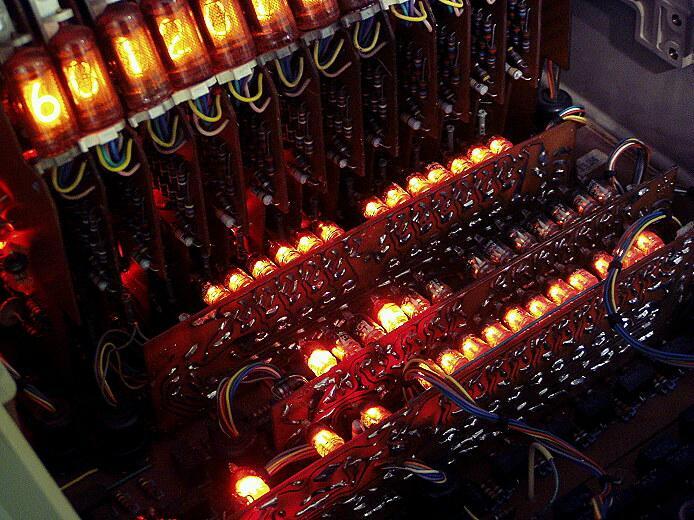the methods required to maintain qubits are exotic.
this site mentions the refrigeration equipment youre referencing i believe https://www.pnnl.gov/news-media/new-superconducting-qubit-testbed-benefits-quantum-information-science-development
It’s not much to look at. Its case—the size of a pack of chewing gum–is connected to wires that transmit signals to a nearby panel of custom radiofrequency receivers. But most important, it’s nestled within a shiny gold cocoon called a dilution refrigerator and shielded from stray electrical signals. When the refrigerator is running, it is among the coldest places on Earth, so very close to absolute zero, less than 6 millikelvin (about −460 degrees F).
This is the right answer. It’s a big cryogenic refrigerator called a Dilution Refrigerator. It’s fancy stuff. Needs Helium-4, which is more common, and Helium-3, which mostly comes from nuclear production.
how in the absurd fuck do they get something that cold
lots of fun techniques, a common one for getting down low enough where other methods become practical is stirling cryocoolers, and those are even on ebay for a few thousand (cascade refrigeration systems, and joule thompson coolers, and a few others are also used), way down past that theres stuff like weird magnetic coolers, and dilution coolers All very interesting, reading about exotic cooling methods is quite fun.
With a refrigerator.
That’s a very big refrigerator
deleted by creator
Early gen tech of any kind usually has a neat look

What is this sexy thing?
That’s her exhaust fan, you pervert!
Google image search says it’s a desk calculator with electron tubes.
Tube amp maybe? An odd one though if so.
Definitely not a tube amp. A tube amp usually has only one or two tubes. This number of tubes implies that they are being used as primitive transistors for logic functions, you can also see a number display made from nixie tubes at the top of the image.
Good point. This is often true. I was thinking of early computers with the big tape reels, which definitely didn’t look interesting, but there are other examples like the one you showed.

No one has given a real answer yet, and I’ve worked with these before, so I’ll explain. The short answer is it has to do with the logistics of cooling something to near absolute zero.
The main component of a quantum computer is a tiny microchip, maybe a few centimeters across. The big chandelier is for cooling and interacting with the quantum computer. (Compare to a desktop computer which has a small CPU chip but most of the computer is for cooling, powering, or otherwise supporting that CPU).
Towards the center of the chandelier thing there is a mechanism called a “dilution refrigerator” which uses weird properties of liquid helium to cool the quantum chip to about 15mK above absolute zero. There are often other refrigeration techniques at work and the dilution fridge does the last step of cooling.
The twisting golden tubes are microwave waveguides. Essentially they are wires that carry signals to and from the quantum computing chip. The twists are there because there is a lot of thermal contraction that happens when cooling from room temperature to near absolute zero, and the loops give the tubes some slack to contract.
Not shown in pictures as often because it’s less exciting, but the whole chandelier thing is put in a big metal cylinder, and that cylinder is within another cylinder, like a Russian nesting doll. Sometimes there may even be a 3rd layer. The air gets pumped out of the cylinders so it’s a vacuum inside. The multiple layers of cylinders are needed because the black body radiation from the outermost layer (which will be at room temperature) would be too much incoming energy to keep the qubits cold enough.
Also not shown is this whole thing is connected to an elaborate system of vacuum pumps, other refrigeration machines, usually a box of electronics for signal generation, and a classical computer (a standard desktop computer) used to control everything.
Note that not all quantum computer types use this kind of chandelier thing, only ones that need the near-absolute-zero temperature, such as superconducting qubits (trapped ion, neutral atom, and photonic quantum computers use very different setups).
This reads like SCP containment procedures.
Thank you!
Quantum states are incredibly fragile and can be disturbed with even the slightest interaction with the environment (called decoherence). These devices are cooled and isolated to the most extreme degrees possible and still at present decoherence severely limits the computations that can be performed.
Just wanted to mention at this point that the quantum computers in this post are the so-called superconducting quantum computers. There are also other architectures like ion and neutral atom quantum computers which are basically steel tubes with viewports that contain a ultra high vacuum. Lasers are used to control the ions or atoms.
There’s also photon quantum computers, but they are even more different and not in a really advanced stage yet.
deleted by creator
Wow so that’s where they got the idea for the tardis engine
Nah, they build a quantum computer in the design of the tardis engine.
Its timey wimey stuff after all
And the design of the computer in the show Devs
what did you just call me
They need cold
;)
Because that’s the cooling system required to run the thing. It requires more toxic coolant, that will eventually end up in the ocean, than several hundred supercomputer megaclusters and sucks more power than a thousand suburbs.
Helium is not toxic and it sure as fuck isn’t going in the ocean after it escapes a quantum computer.
It’s also one of the most abundant elements in the universe
But it is difficult to acquire here on earth.
As uranium and thorium naturally decay underground, they produce some helium as well. That’s why you can literally make a helium mine. On earth it’s also a finite resource, because once released into the atmosphere, it will eventually escape the atmosphere and end up in space.
Because that’s the cooling system required to run the thing. It requires more toxic coolant, that will eventually end up in the ocean, than several hundred supercomputer megaclusters and sucks more power than a thousand suburbs.
Congrats on getting upvotes for this utter bullshit, none of which is substantiated in the article you linked.
Edit- this was at +15 when I first saw it.
I am just now realizing: Baroque In Mind… Broken mind? Maybe they’re a troll.
I’m prepared to be proven wrong on this, as my exposure to quantum computer cooling systems has been super brief, but as far as I know there are no toxic coolants.
The pre cooler is a Pulse Tube Refrigerator, and the main cooler is a Dilution Refrigerator. Those both use helium, and that stuff floats out into space. I doubt it’s going into the ocean. Here’s another article that talks about the operation.
Like I said though, my exposure was brief. Unfortunately we didn’t land any projects with the supercomputer people 😞. I’m always down to learn more about niche topics though. Makes me super fun at parties. If you have good sources shoot them my way. I couldn’t find anything in my 5 ish minutes of web searching.
Wrong. I breathed in some helium once and it made my voice all high pitched which threatened my fragile masculinity. Very toxic.
(/s…)
Never worked much with cryogenics, but the one thing I learned was to never get in an elevator with (large quantities of) liquid nitrogen — if the elevator stops it can displace the oxygen and that’s…kinda bad.
Yeah, totes. Scentless non-toxic gases can still be deadly by merit of not being oxygen.
The only recreational octave-shifting gas I indulge in is Sulfur Hexafluoride. Bolsters the ol’ baritone.
That’s no bueno for the environment.
I just looked it up and…
SF6 has 23,500 times greater global warming potential (GWP) than CO2 as a greenhouse gas (over a 100-year time-frame) but exists in relatively minor concentrations in the atmosphere. Its concentration in Earth’s troposphere reached 11.50 parts per trillion (ppt) in October 2023, rising at 0.37 ppt/year.[8] The increase since 1980 is driven in large part by the expanding electric power sector, including fugitive emissions from banks of SF6 gas contained in its medium- and high-voltage switchgear. Uses in magnesium, aluminium, and electronics manufacturing also hastened atmospheric growth.[9] The 1997 Kyoto Protocol, which came into force in 2005, is supposed to limit emissions of this gas. In a somewhat nebulous way it has been included as part of the carbon emission trading scheme. In some countries this has led to the defunction of entire industries.[10]
Umm wtf? Why are we selling this stuff in compressed air cans ? Even methane is “only” 30x more potent than CO2 .
3M made a great alternative I actually tried to get my company into, Novec 4710… But turns out they’ve stopped making it.
The bitch about SF6 is that it’s so stable (as required, to resist high voltage electric breakdown) that it also lasts way, way long in the atmosphere.
Yeah man, I don’t know. I think we need to just use less energy, as a species.
I believe you may have misread your own source.
For example, the world’s fastest supercomputer, Frontier, draws 8 megawatts when it idles — a quantity that could simultaneously power thousands of homes
If this was the basis for your saying this…
several hundred supercomputer megaclusters and sucks more power than a thousand suburbs.
… then you misread AND misstated.
Misread: this “thousands of homes” energy use was in reference to Frontier, which is not a quantum computer but based on more conventional architecture, the kind the article goes on to say might eventually be improved upon by quantum computing. Eg:
Consequently, experts are looking to new strategies that can rein in energy use while continuing to improve computing performance. One proposed solution: quantum computing.
Misstated: “thousands of homes” != “thousands of suburbs.”
A suburb is not a home but a a collection of homes, a region of a city even. See definition:
an outlying part of a city or town. b. : a smaller community adjacent to or within commuting distance of a city. c. suburbs plural : the residential area on the outskirts of a city or large town.
So in your zeal to make your point you demonized quantum computers, which could be a solution to the problem you’re ostensibly so concerned about, and in the process you misstated a metric by at least one order of magnitude.
So yeah… I don’t know what to tell you. You really messed up here. Your problem is with LLMs and big compute, not necessarily quantum computers.
Good stuff! I rescind my comment and defer to all your corrections.
A quantum computer using current technologies can’t scale to that size. Enormous advances over what is now currently possible would be required to get it to that number of qubits, and then the whole issue of cooling can be revisited.
Wow, that is insane! But it’s also amazing that it has been able to solve problems that humans haven’t been able to solve in over 50 years.
What are you talking about? Most of these things are experimental and none of them have solved a single fucking thing.
From the linked article
In 2020, the artificial intelligence (AI) software AlphaFold demonstrated that it could predict the three-dimensional structure of proteins from their amino acid sequence2, a 50-year old grand challenge in biology.
They did not say that was achieved with quantum computing
Eta - here is a more suitable quote from the article:
For instance, a 2020 demonstration showed that a quantum computer could perform a math puzzle using 50,000 times less energy than the world’s most powerful supercomputer at the time.
Because the pictures are there so you’ll think “wow science” and give them money.
No.
So you’re a believer eh?
So you’re a conspiracist, eh?
Is a crime happening?
Yes.
What do you have to go by?









